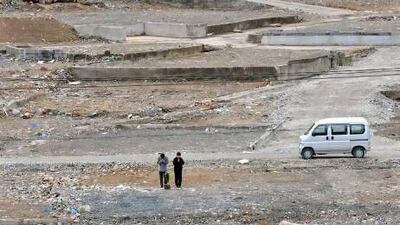TOKYO // "It's not a normal day for Japan," said Yuichi Tsuboi, a 28-year-old businessman standing in his winter coat on a busy Tokyo street.
Minutes earlier, Mr Tsuboi - along with everyone else in view and millions more across Japan - had stopped, closed his eyes, lowered his head, joined his hands together in prayer and paused in reflective silence.
Yesterday, at 2.46pm, the island nation stopped everything to remember the 19,000 people who died in its worst post-war disaster.
It was exactly one year earlier that the first ominous tremor of what would become known as the Great East Japan Earthquake rattled buildings across Japan.
The 9-magnitude earthquake triggered one of the world's worst tsunamis and the world's worst nuclear crisis since Chernobyl in 1986.
From the tsuanmi ravaged cities of Iwate prefecture and Miyagi prefectures to the nuclear-hit Fukushima region, home to the devastated nuclear plant, thousands gathered to pray, lay flowers and remember the dead.
In Tokyo, trains stopped for a minute and messages of hope were illuminated in the newly completed Tokyo Skytree - the world's tallest communications tower. This was no ordinary Sunday.
"In daily life, things might seem to be back to normal for many people on the surface," said Mr Tsuboi.
"But what happened last year affected everyone.
"Inside, I think most people still have very sad feelings about what happened but cannot always show them. This is an opportunity to show how we feel."
Mr Tsuboi spoke standing in a crowd waiting for glimpses of Emperor Akihito and his wife, Empress Michiko, as they made their way to and from the Imperial Palace to the nearby National Theatre where the main memorial was held.
More than 1,200 people were gathered in the modernist concrete confines of the National Theatre, with flags flying at half mast, helicopters flying overhead and police cordoning off surrounding streets.
In addition to the emperor and his wife, others attending the ceremony included Japanese politicians and ambassadors from around the world as well as relatives of those who died.
The emperor's presence was likely to have been widely appreciated: there were fears this week that he would not be able to join the event because of his recent heart surgery.
But the 78-year-old monarch insisted on being there and gave a solemn address of hope to the nation during his 20-minute visit.
"I would like to take this opportunity to express my deepest gratitude to the people who have worked for the afflicted people and afflicted regions and those who have been trying to contain the damage from the nuclear power plant accident," he said.
"It is important for us to never forget this disaster and hand down the lessons we learnt to future generations, and foster the proper attitude towards disaster prevention, with the aim of making our country a safer place.
"I would like to express my hope that Japan will become once again a country where people can live with a sense of security and again offer my sincere condolences for all those who lost their lives in the Great East Japan Earthquake."
Despite the message of hope, however, for many in Japan there remain lingering concerns - from the bureaucratic delays that have stalled the start of the rebuilding process in many regions to the fact that more than a quarter of a million are still homeless.
The biggest concern is the Fukushima Daiichi nuclear power plant. The tsunami wiped out the power plant, killing crucial cooling systems and triggering a series of explosions and meltdowns.
The radiation leaks forced the evacuation of more than 80,000 residents. One year on, concerns about the impact on health and the contamination of food remain strong.
Yesterday, not far from the National Theatre ceremony, the sound of drums, whistles and chanting filled the air as a major anti-nuclear protest march wound its way peacefully past the headquarters of Tokyo Electric Power Company - operators of the Fukushima plant - and on through the streets of the upmarket Ginza shopping district.
Among those taking part was Karen Kusano, a 32-year-old hotel operator from Tokyo, wearing a black baseball cap and pink face mask.
"This is the first time I've ever taken part in a political march," she said. "But over the past year, more and more of my friends have become involved in speaking out about the nuclear situation and I felt I should too."
"The reason I'm here today is because I'm worried about the next generation, our children and our grandchildren and how they will be affected by this crisis.
"Today is the first anniversary of the disaster, but this is a more long-term concern. This is not something Japan can just forget about."

